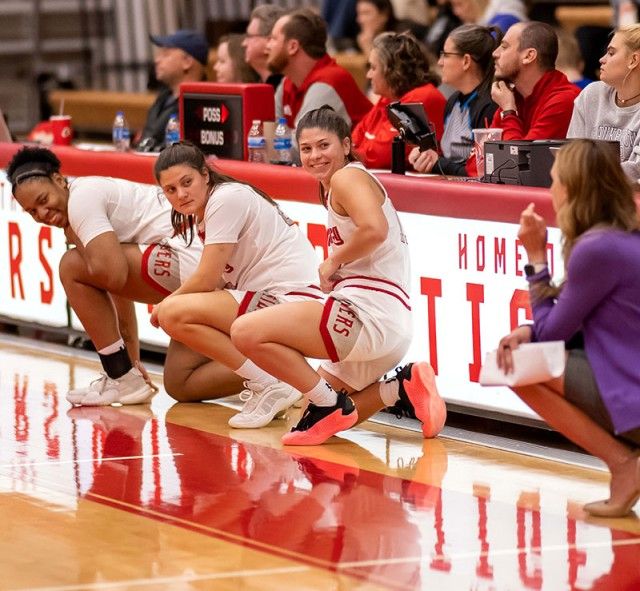Janet E. Jackson, a 1975 graduate of Wittenberg University, is known for breaking new ground. During the City of Springfield’s Martin Luther King Jr. luncheon, “Community Building, Caring for the Community,” on Friday, Jan. 16, Jackson told the nearly 400 people in attendance how the work of Dr. Martin Luther King Jr. has affected her life as she shared many of her experiences as a leader in her field and as a student at Wittenberg.
Appointed in November 2002, Jackson is the first woman and the first African-American woman to lead the United Way of Central Ohio in its 80-year history. She was the first woman elected Columbus City Attorney, which made her the chief legal adviser for the capital city during her term. Jackson was also the first African-American judge in Franklin County, where she served from 1987-1996.
Introduced by Wittenberg University President Baird Tipson, Jackson told the audience, “I’m so pleased to be back home. Even though my hometown is in Virginia and I now reside in Columbus, I have always considered this community my home.”
Jackson’s address followed an awards ceremony where many Springfield and Clark County schoolchildren were recognized for their accomplishments in honoring Martin Luther King Jr. by writing essays, making posters and setting examples in their schools as peacemakers.
“I’m thrilled there are many young students here today, so adults, please allow me to begin by sharing some things especially for them,” Jackson said. “I grew up in a rural town in southern Virginia that had no McDonalds then and still doesn’t have one now. My town had no stoplight, and it remains without one, and no, I don’t sing, but yes, I do have a brother named Michael. Really.”
After the laughter subsided, she continued, “What I want you to know is that I grew up hearing about Dr. Martin Luther King Jr.’s work for fairness and equality, while he was still alive. I went to an all-black grade school because the law then required me to. When it was time for me to attend high school, I was one of the very few who chose to attend a high school where I was of different color, a definite minority, and I rode the bus an hour each way to school and back home.”
Jackson described how tough it was then and about how she was beaten on those long bus trips many times and called every bad name imaginable. “But thankfully, I was raised with good teachers, parents, aunts and uncles who always told me I could do it,” she said.
Looking out at the students, she assured them, “I don’t care what you think might get in your way, you need to get it out of the way.”
Jackson spoke with pride when she exclaimed, “I am also here today to lift up my alma mater, Wittenberg, for it was there that I was encouraged, inspired and taught the values that carry me through my work and life today.”
Looking toward a table of people from Wittenberg, Jackson said, “I still have my English papers from (Associate Professor Emerita of English) Mabel Jackson, and I hoped she’d be here so I could tell her she remains one of the greatest influences on my life.” Just then the professor waved from somewhere else in the crowd.
“Oh, Professor Jackson!” she exclaimed. “Some people were scared to death of Dr. Jackson because she was hard, but she taught me to be the person I could.”
Jackson asked the men in the audience to forgive her for saying that she has far more “sheros” than heros in her life. She cited a favorite quote displayed on a plaque in her office that reads, “Service is the rent we pay for living. It is the purpose of life and not something we do in our spare time.” She explained the quote comes from Marian Wright Edelman, “one of the country’s strongest advocates for children and another of my sheros.” Those words inspire her to do better for the community.
Jackson said she often reminds her 14-year-old son that as a society we are prone to judge success by the index of our salaries and the size of our vehicles and not the quality of public service we provide.
“I would challenge you as individuals to take the blinders off,” she added. “I had them on. I thought I was enlightened until the first time I visited the warehouse on Broad Street in Columbus where our more than 700 homeless families reside.”
Jackson said homelessness in Columbus has increased 15 percent in the last year. “We cannot stand by and be complacent, we must fight the ‘ism’ in poverty and offer ways to serve others,” she said.
She suggested solutions, including tutoring and mentoring children. “Become the one caring adult in a child’s life because often they don’t get that at home,” she said.
Jackson urged the audience to remember the late Dr. King’s words, “as long as there is poverty in the world, even if I have a billion dollars, I can never be what I ought to be.”
“More than any other event or commemoration, this day (Martin Luther King Jr. Day) serves as a reminder of the work still needed to be done,” she said. “It’s so easy to not see poverty, but the reality is that one out of every six children are living in poverty and 48 percent of the single women, head of households, are in poverty.”







